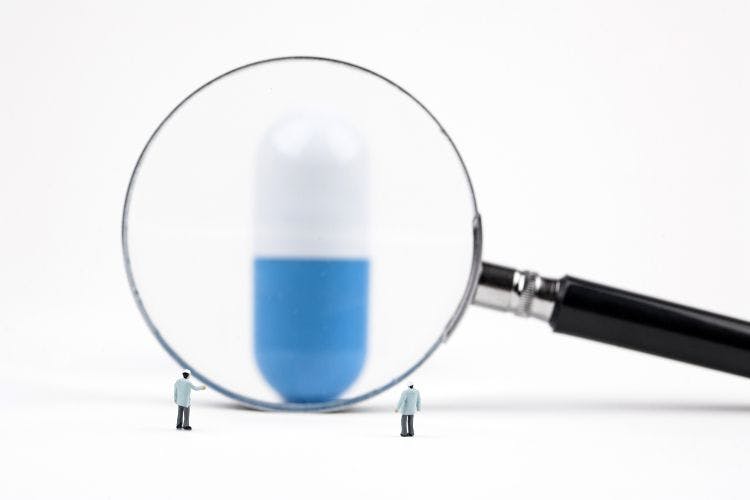Nutritional Outlook’s 2018 Best of the Industry Awards, Industry Leader: Senator Orrin Hatch
As Senator Hatch retires his congressional seat this year, industry leaders reflect on how his support paved the road to today’s dietary supplement industry.
Photo courtesy of Office of Senator Orrin Hatch

There are few figures more revered in the dietary supplement industry than Senator Orrin Grant Hatch, the Republican senator who has represented the state of Utah since 1977 and championed dietary supplements throughout his career, most notably with his most seminal contribution: the passage of the Dietary Supplement Health and Education Act of 1994 (DSHEA). Introduced by Senator Hatch in 1993 and co-sponsored by Democratic Senator Tom Harkin of Iowa, DSHEA laid the foundation for what the dietary supplement industry has become today.
“The Dietary Supplement Health and Education Act was the watershed event that created the modern dietary supplement industry by finally creating a regulatory home that included, for the first time, a legal definition for this category of products within foods,” explains Frank Lampe, vice president, communications and industry relations, United Natural Products Alliance. “It established a regulatory structure and good manufacturing practices and also provided the U.S. Food and Drug Administration with abundant power to enforce the new law through a defined safety standard and authorities. The law explicitly allowed certain third-party literature to be provided in conjunction with a sale and for statements of nutritional support, or structure function claims. Additionally, the law also established the Office of Dietary Supplements at the National Institutes of Health, to foster independent scientific research about the benefits of supplements.”
DSHEA enabled the growth and prosperity of dietary supplements as an industry as well as a resource consumers rely on to live a healthy lifestyle. “Today, more than 170 million Americans take dietary supplements each year,” says Mike Greene, senior vice president, government relations, the Council for Responsible Nutrition. “The dietary supplement industry provides 750,000 good paying jobs in the United States, and with national sales just under $50 billion, the industry continues to thrive and grow.”
Providing some historical context, Daniel Fabricant, PhD, CEO and president of the Natural Products Association, explains that prior to DSHEA, the U.S. Food and Drug Administration treated dietary supplements as food additives, making ingredients subject to extensive toxicological testing despite most of the ingredients in question having precedent as a food. This was under a new FDA policy bolstered by the passage of the Nutrition Education Labeling Act in 1990, which considered any non-vitamin or mineral dietary supplements to be food additives, not food, as they had been regulated as since the passage of the Federal Food, Drug, and Cosmetic Act in 1938.1
At the same time, there was a self-care movement in which more and more people were taking supplements. Senator Hatch was one of them. Beyond his responsibility to Utah, which has a high concentration of dietary supplement manufacturers, he cared about the products and the people taking them. “He took the products, believed in the products. It was the way he stayed healthy,” says Fabricant. “Senator Hatch was a boxer at a young age. He was athletic, very much interested in health.”
“He clearly understands how [supplements] support the wellbeing of millions of Americans and how important broad access to the products is for those consumers,” says Lampe. This, too, is one of DSHEA’s most important achievements, beyond helping manufacturers. “Its importance cannot possibly be overstated as it ensured that consumers had broad access to safe and reliable products” by enabling the industry to innovate responsibly, Lampe explains. “Instead of assuming all companies are making unsafe products, the law operates on the assumption that most products are safe, and the burden of proof is on the agency to prove otherwise.”
It’s also important to note, in these currently polarizing political times, that DSHEA was created under bipartisan leadership, showcasing the senator’s gift of reaching across the aisle.
Beyond DSHEA
DSHEA is far from the only contribution Senator Hatch has made to the industry. He has consistently demonstrated his commitment to defending the rights of both dietary supplement manufacturers and consumers. His commitment led to the achievement of other supplement-related policies, including the release of Good Manufacturing Practices for dietary supplements (cGMPs), serious adverse event reporting, and the Designer Anabolic Steroid Control Act (DASCA).
“Ten years after DSHEA became law, many in the industry were concerned that FDA was not implementing or enforcing the law,” explains Greene. “GMPs for dietary supplements had yet to be finalized or promulgated, and in the wake of FDA banning ephedra, there were growing concerns about the safety of dietary supplements. Senator Hatch called on FDA to release GMP [regulations], and passed legislation, supported by many stakeholders, including the industry, that would require serious adverse event reporting for dietary supplement (and non-prescription drug) manufacturers.”
Ironically, the adverse event reporting law saw some resistance from industry companies, says Fabricant. “There were a number of companies at that time in 2006 that thought it was a terrible idea, and a lot of those companies were in Utah,” he explains. “They thought this was going to be hung around their necks like an albatross, and that wasn’t the case at all.”
Once again, Senator Hatch brought people together to compromise. “Senator Hatch really worked with people on both sides of the aisle-people like Dick Durbin, who has been a critic of the industry, and Joe Biden, who at the time was a critic of the industry,” says Fabricant. “He brought them over to the table, brought the OTC folks to the table, and brought the dietary supplement industry people who were opposed, and got it done.”
As bad actors began selling falsely marketed dietary supplements spiked with anabolic steroids, Senator Hatch took additional action to protect consumers and the reputation of the dietary supplement industry by introducing the Designer Anabolic Steroid Control Act alongside Democratic Senator Sheldon Whitehouse of Rhode Island. This legislation provided the Drug Enforcement Agency the authority to remove designer anabolic steroids from the market and stop them from being added to sports nutrition products.
Legacy
A similar sentiment shared by many involved in the dietary supplement industry is that no one can replace a champion such as Senator Hatch. His support was singular. “It will be impossible to replace the experience, knowledge, and love that Senator Hatch has for the dietary supplement industry,” says Greene. “But we can continue to make new friends and build alliances.”
Indeed, there do remain friends to the industry within Congress, as is demonstrated by the nearly 50-member bipartisan Dietary Supplement Caucus. So, while no one can replace him, one can hope that there will be those who follow his example.
References:
- Myers S. “The Importance of DSHEA: Past, Present and Future.” Natural Products Insider. www.naturalproductsinsider.com/regulatory/importance-dshea-past-present-and-future. Accessed November 15, 2018.

HHS announces restructuring plans to consolidate divisions and downsize workforce
Published: March 27th 2025 | Updated: March 27th 2025According to the announcement, the restructuring will save taxpayers $1.8 billion per year by reducing the workforce by 10,000 full-time employees and consolidating the department’s 28 divisions into 15 new divisions.















